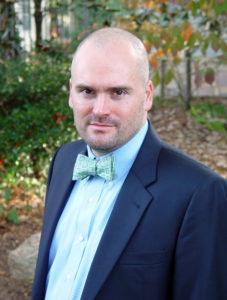December 1941. London. The worst of the blitz just ended. A nation at war faced Christmas. The BBC’s charge? Uplift the spirits and strengthen the spines of Britain with a radio drama about Jesus. The whole nation will tune in. Needed: One writer who can tell history’s most powerful story to a people facing unprecedented evil.
Who did the BBC choose to write the play The Man Born to Be King?
A genius.
Was it C.S. Lewis? Nope. It was Dorothy Sayers. And you know how Sayers got her start as a wordsmith? If you guessed “advertising copywriter,” you nailed it in one. Give yourself a chocolate.
Sayers spent the years 1922-1931 writing ad copy. Her clients included a mustard company and the producers of Guinness beer. She is credited with coining the phrase, “It pays to advertise.”
Dorothy Sayers wasn’t just any old copy hack, and I don’t mean to give the impression that she was. She was one of the first women to attend Oxford University. Her scholarship of Dante is legendary. She was an acclaimed novelist and poet. Her works on theology, feminism, and creativity are cited regularly by writers today. But with all that talent, she spent nine years writing about such riveting topics as mustard and beer. In fact, her first novel was entitled Murder Must Advertise and is about the death of a copywriter in his office at an ad agency.
Some folks might argue that it was Sayers’ theological scholarship or skill as a novelist that earned her the privilege of writing The Man Born to Be King. She was a heavyweight theologian and novelist, for sure, but I believe Sayers alone could write the BBC’s most important religious and political work because she was an ad copywriter at heart. That means everything she wrote, she wrote with her audience in mind. She wrote with a creative eye on those people who would turn on their radios, shush their children and enter into a story world that lit their homes with hope in a time of deep darkness.
The radio drama, The Man Born to Be King, proved to be among the BBC’s most controversial productions ever. One religious group even claimed the fall of Singapore was proof of God’s disapproval of the program.
Why such a fuss? A passion play is pretty dry fare for church folks these days. Not in 1940s England though! The BBC even had to garner special governmental permission to include Jesus as a character in the production. And what a Jesus he was!
Sayers made her characters speak in the everyday slang, jargon and accents of 1940s Britain. The Biblical characters were just like the hearers’ neighbors, full of conflicting motivations and common human feelings. It was dramatic. Thrilling. Immediate.
Mailboxes at the BBC soon swelled with letters from people telling how the drama had indeed uplifted their spirits, strengthened their resolve, and in many cases, reintroduced them to a life lived in the Spirit of the Man born to be king. C.S. Lewis read the play every Holy Week. In his letter to Sayers, Lewis wrote, “I shed real tears (hot ones) in places.”
Dear Aspiring Novelist, do you want to write a narrative that can bring tears to the eyes of C.S. Lewis and inspire a nation to live its faith in the face of evil’s onslaught?
Start by writing advertising copy.
All the time that Dorothy Sayers wrote about beer and mustard, she was learning how to communicate with the average British buyer of her day. She knew what he spent his money on, so she knew his heart and imagination. Better than any other scholar or novelist, she knew those folks had no time or emotional space for a scholarly, erudite, and high-sounding Jesus. If He was to matter to them, He had to talk like them. His friends and neighbors had to sound like their friends and neighbors.
Where did Sayers learn that? At Oxford? Hardly. She learned it staring at a blank piece of paper, wracking her brain for a way to make mustard meaningful.
I write ad copy for hotel chains, and we call that “guest-centered copy.” When I worked in non-profit communications, we called it “donor-centered copy.”
What does it mean to write with your audience in mind? Three quick things:
- Tell them exactly what they want to know. Avoid pure marketing speak. Since the time readers spend on websites can now be measured in nanoseconds, every word has to be informative as well as interesting. As my editor told me, “Don’t just say the hotel is an oasis of comfort. Say what makes it an oasis of comfort.”
- Use everyday language. Unless you are writing advertising copy for a swanky brand, stick with plain language. Someone recently said to me, “It’s Dollywood, not Hollywood.”
- Imagine the scene from the reader’s or buyer’s perspective. What feeling do they get when they imagine themselves swimming in your hotel’s pool, spreading your mustard on their sandwich, or pouring out a glass of your brand of beverage? Evoke that feeling.
Of Jesus’s passion, Sayers’ wrote, “God was executed by people painfully like us, in a society very similar to our own.”[1] Because she was an advertising copywriter, Sayers got – really got – people “painfully like us.”
Want to write a write a story that’s powerful enough to bring C.S. Lewis to tears? Learn to write buyer-centered ad copy first. You’ll be amazed what it does for your storytelling prowess. Oh, and did I mention that writing ad copy pays? Yep, it pays to advertise.
About Holland Webb
I love telling the stories that people put down so they go take action. I’m an advertising copywriter by day, an aspiring novelist by night, a parent, a dog-lover, a prison volunteer and a follower of Jesus.
[1] Read more:http://www.touchstonemag.com/archives/article.php?id=26-02-018-v#ixzz4WJX3Txy8





No Comments